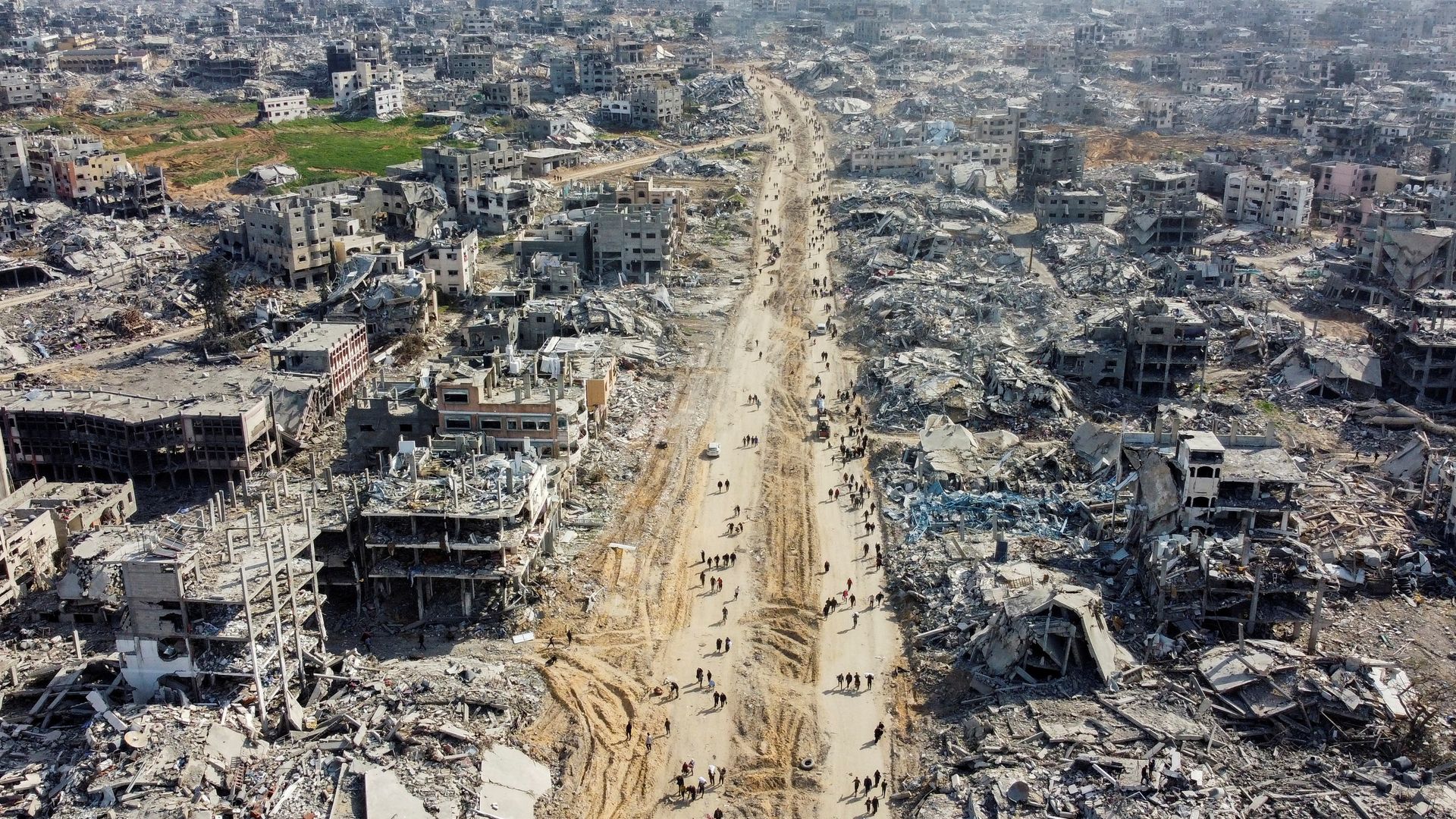
[RYAN ROBERTSON]
PRESIDENT DONALD TRUMP’S SURPRISE SUGGESTION THAT THE UNITED STATES SHOULD TAKE OVER THE GAZA STRIP IS STILL CAUSING SOME CONSTERNATION IN THE INTERNATIONAL COMMUNITY. THE PRESIDENT AND HIS TEAM DID OFFER A FEW MORE DETAILS ON THE PLAN SINCE ITS INITIAL UNVEILING DURING A PRESS CONFERENCE WITH ISRAELI PRIME MINISTER BENJAMIN NETANYAHU–LIKE HOW THE STRIP WOULD ONLY COME UNDER U.S. CONTROL AFTER THE FIGHTING WAS DONE THERE.
THROUGHOUT ISRAEL’S WAR IN GAZA AND THEN WHEN IT EXPANDED TO OTHER FRONTS, I’VE TALKED WITH AVI MELAMED TO GET HIS INSIGHTS. HE’S A FORMER ISRAELI INTELLIGENCE OFFICER AND HOSTAGE NEGOTIATOR. HE’S NOW A REGIONAL ANALYST, AUTHOR, AND FOUNDER OF INSIDE THE MIDDLE EAST.
Ryan Robertson:
Avi Malamed, I really want to thank you once again for joining us. As so is often the case, your predictions came true. Egypt, Jordan, and others– Hamas– have all come out and said President Trump’s idea of the US taking over Gaza is a bad one. But you think that might just be more public rhetoric and not necessarily what some of these folks actually think. Expand on that if you would for us.
Avi Melamed:
As you said, across the Arab world, you see the total rejection of Trump’s initiative. It is kind of like the major justification for that rejection is under the code word of the ‘Palestinian cause.’ The argument is that if Palestinians are going to be temporarily relocated and United States will take over, that will actually mean the end of the Palestinian cause. Needless to say, of course, that Hamas rejected it, of course. But this is the surface.
I would say something like that for the Arab states, Gaza Strip is not less of a challenge than when it comes to the issue of Israel, for example. They all basically understand that this is a hot potato, particularly since Hamas took over Gaza Strip in 2007, and Gaza Strip became a constant hub for never-ending violence and instability that radiates to Egypt and to Jordan and to Saudi Arabia and other places.
So, I wouldn’t be surprised at all if in the back rooms, in the back channel, those effectors that express such a robust rejection actually would very much like to see United States take over this whole potato. Because in the end of the day everyone expressed the same objective. They say Hamas cannot resume its control or rule over Gaza Strip. That is very nice. This is a good objective. Now, how do you get there?
All the suggestions that have been made thus far failed to achieve that objective. And so I think that when you look at the rejection across the board, I would say look at the things that are not formally expressed.
Ryan Robertson:
As far as from like a logistics perspective, mean, you obviously have some insight into, you know, Israeli dealings in Gaza. How do you get 2 million people who call the Gaza Strip home to leave, willingly or unwillingly? How do you get them to resettle somewhere else?
Avi Melamed:
Look, first we have to differentiate because there are areas in Gaza Strip that relatively speaking are intact, like for example Gaza City, the center of Gaza; relatively speaking, intact. The northern part of Gaza is the one that sustained the most significant damage and also some areas in the center part of Gaza. So, those are areas that anyhow need to be addressed. you know, in the last couple of weeks, we have been bombarded by all kinds of reports or semi-reports from international agencies, including the UN, that basically say it will take years to rehabilitate and so on and so.
So now the question is very simple. You’ve got hundreds of thousands of people that have nothing. No houses, no infrastructure, no medical system, no schools, no nothing. And their addresses has to be addressed. And people are saying it’s going to take years and years.
So here is something that is kind of like an puzzling situation because, ironically speaking, I would say that I noticed that many in the West who pointed themselves, positioned themselves as the, you know defenders of the Palestinians and concerned about the Palestinians’ well-being are the same people at the same time are saying now to the Palestinians, don’t leave your land. Because regardless of your dire situation, remain where you are. Which is–they remain for what? They have nothing there.
And the most significant thing that is totally absent from the Western discussion, at least for the last 24 hours that I’ve been following, is the fact that many people in Gaza Strip say ‘We don’t want to stay in Gaza Strip any longer. We have nothing for to stay in Gaza Strip. And particularly if it’s going to be yet again under Hamas rule, what should they stay for? For the next military round or for the next violence that will take place? For what?’
I can tell you that many people in Gaza Strip not only want to get out of Gaza Strip, many people in Gaza Strip will be happy if the United States will take control over Gaza Strip. And, as I said before, I wouldn’t be surprised if Arab major players in the backroom would say, we wish the United States would take control over Gaza Strip.
Ryan Robertson:
How’s the uh–, I mean, obviously you’re not in Israel right now. You’re traveling around the United States giving talks. Hopefully I can make one of them. I don’t think I’ll be able to, but I’m sure you have contacts in Israel. How was this being received back home?
Avi Melamed:
Look, across the board, would say, of course, looking at the Israeli Zionist parties, I’m not talking about the Israeli Arab parties, even though this is an interesting aspect for itself. But the Israeli Zionist Israeli parties across the board, roughly speaking, are favoritely looking at Trump’s statement. Let’s put it this way.
Still, I think it caught everyone off guard, including the Israeli political system. By the way, I think also caught off guard the Prime Minister Netanyahu, at least if to judge according to his body language during the press conference last night. So I think that across the board,
Ryan Robertson:
Yeah, he didn’t endorse it, but he’s like, it’s a worthwhile proposal worth exploring and, very smiley.
Avi Melamed:
Yeah, I mean, yeah, it seems like it, you know, anyhow–I think that the reason for the, I would say the roughly speaking across the board, the Israeli Jewish Zionist camp, kind of like favoritely looking at the statement is exactly because of what I said before. Meaning we have been standing in this puddle for last 40 years, and particularly following after Hamas took over Gaza Strip. Nothing was changed on the ground. In fact, everything got more and more severe on the ground.
And so there was a need for some sort of like some, something out of the machine, Deus ex machina, sort of speaking, that will bring some new element to this equation. And it does. It brings new element to the equation. Obviously, there are different reactions to it, as we all know. But at least it brings something new to the equation. At least it creates some sort of a new motion that will be something different from what we have experienced for the last couple of decades.
And it goes back to what I said before. You can’t hold the stick on both sides. You can’t say on the one hand, the Palestinians in a dire situation, they need humanitarian aid, Gaza Strip needs to be recovered and rebuilt. It will take years and billions. And at the same time, to say to the Palestinians, you should stay where you are, cannot, you don’t have the right, the individual right to pursue happiness and future.
This is something that I would look at a very cynical, not to say, Hippocratic approach. One of the most basic values of the West is the right of people to pursue their happiness. So what gives you the right to tell Palestinians who are in dire situation and need desperately solution, don’t go there and just stay where you are. It’s something that I think is very condescending, and very twisted.
Ryan Robertson:
You Avi Malamed, as always, really thank you. You know, I’m sure we’ll speak to you again very soon. Who knows about what topic with the way things are going, but I really appreciate your time.
Avi Melamed:
There is no lack of topics. Yeah, sure. Thank you.
[RYAN ROBERTSON]
FOR MORE OF OUR PAST DISCUSSIONS WITH AVI MELAMED, DOWNLOAD THE STRAIGHT ARROW











